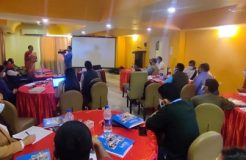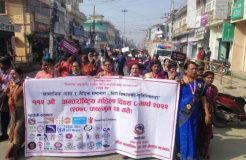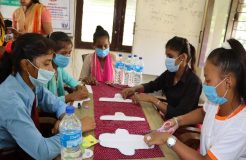Menu
- Celebrating 12 Years
SRHR
Thematic Area / SRHR

Enhanced the capacity of government officials to provide integrated, quality sexual and reproductive health services.
In order to orient and inform local-level stakeholders about the Safe Motherhood Roadmap and advocate for the inclusion of safe motherhood-related activities in their annual workplans and budgets, LIFE Nepal organized a one-day "District Level Safe Motherhood Roadmap Advocacy Workshop." The workshop was attended by mayors, deputy mayors, and health coordinators from four districts in the Madhesh province (Dhanusha, Mahottari, Bara, and Parsa), with a total of 168 participants comprising government officials and elected representatives. During the workshop, participants identified gaps and challenges in Safe Motherhood indicators and developed an activity plan to advocate for the inclusion of these initiatives in the annual work plan through the local-level planning process. Furthermore, they expressed commitment to supporting the provincial government's goal of establishing the Madhesh province as a complete Safe Motherhood province.

Young people possess the skills and knowledge necessary to make informed decisions regarding their health and well-being, and they are equipped to actively participate in decision-making processes.
LIFE Nepal provided support to the Ministry of Women, Children, Youth, and Sports (MoWCYS) in commemorating International Women’s Day at the Provincial Level. The 112th International Women’s Day, themed "Gender Equality Today for Sustainable Tomorrow," was celebrated through three major activities: a rally, Tuk-Tuk mobilization, and the presentation of a video addressing issues such as mitigating gender-based violence, promoting gender equality, preventing child marriage, and combating girls trafficking in the Madhesh Province on March 8, 2022. Approximately 2,500 individuals became aware of gender equality and women's involvement in sustainable development through Tuk-Tuk mobilization. Additionally, around 300 people gained awareness about avoiding harmful practices against women through the video display program.

Sanitary Pad Training
LIFE Nepal organized a crucial and essential activity for adolescent girls, namely, sanitary pad making training for menstrual hygiene. This training was conducted in small groups, adhering to safety measures such as social distancing, mask usage, appropriate venue selection, and hand sanitization. The girls from schools benefited significantly from this initiative, gaining knowledge on how to prepare sanitary pads using locally available materials at home. A noteworthy outcome is that many of the trained girls started using sanitary pads that they developed themselves at home, utilizing local and readily available resources. This not only proved to be cost-effective but also a safe alternative, especially during the COVID-19 pandemic when there were concerns about moving outside the home to purchase sanitary pads. Furthermore, the sanitary pads developed by the girls were also utilized by their family members. This care-oriented approach was particularly meaningful as the pandemic created apprehensions about going to shops to buy sanitary pads for both the girls and their family members. Additionally, the trained girls extended their skills to other friends in the community, teaching them how to make sanitary pads using locally available resources. They also provided sanitary pads to friends in need during the COVID-19 pandemic. This initiative played a crucial role in ensuring menstrual hygiene and health for adolescent girls, which became even more significant during the stay-at-home measures implemented during the pandemic.

LIFE Nepal is a non-profit organization dedicated to promoting children’s rights and equality for girls. It was registered at the District Administration Office, Dhanusha, in 2012.
Quick Links
Resources
Contacts
Pidarichowk, Janakpur, Dhanusha
Madhesh Province, Nepal
Copyright ©2024 Lifenepal.org. All Rights Reserved.
LIFE Nepal | Developed By N1technology Pvt. Ltd..
